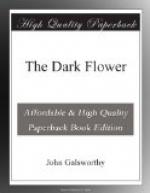They said that about forty-five was a perilous age for a man— especially for an artist. All the autumn of last year he had felt this vague misery rather badly. It had left him alone most of December and January, while he was working so hard at his group of lions; but the moment that was finished it had gripped him hard again. In those last days of January he well remembered wandering about in the parks day after day, trying to get away from it. Mild weather, with a scent in the wind! With what avidity he had watched children playing, the premature buds on the bushes, anything, everything young—with what an ache, too, he had been conscious of innumerable lives being lived round him, and loves loved, and he outside, unable to know, to grasp, to gather them; and all the time the sands of his hourglass running out! A most absurd and unreasonable feeling for a man with everything he wanted, with work that he loved, quite enough money, and a wife so good as Sylvia—a feeling that no Englishman of forty-six, in excellent health, ought for a moment to have been troubled with. A feeling such as, indeed, no Englishman ever admitted having—so that there was not even, as yet, a Society for its suppression. For what was this disquiet feeling, but the sense that he had had his day, would never again know the stir and fearful joy of falling in love, but only just hanker after what was past and gone! Could anything be more reprehensible in a married man?
It was—yes—the last day of January, when, returning from one of those restless rambles in Hyde Park, he met Dromore. Queer to recognize a man hardly seen since school-days. Yet unmistakably, Johnny Dromore, sauntering along the rails of Piccadilly on the Green Park side, with that slightly rolling gait of his thin, horseman’s legs, his dandified hat a little to one side, those strange, chaffing, goggling eyes, that look, as if making a perpetual bet. Yes—the very same teasing, now moody, now reckless, always astute Johnny Dromore, with a good heart beneath an outside that seemed ashamed of it. Truly to have shared a room at school—to have been at College together, were links mysteriously indestructible.
“Mark Lennan! By gum! haven’t seen you for ages. Not since you turned out a full-blown—what d’you call it? Awfully glad to meet you, old chap!” Here was the past indeed, long vanished in feeling and thought and all; and Lennan’s head buzzed, trying to find some common interest with this hunting, racing man-about-town.
Johnny Dromore come to life again—he whom the Machine had stamped with astute simplicity by the time he was twenty-two, and for ever after left untouched in thought and feeling—Johnny Dromore, who would never pass beyond the philosophy that all was queer and freakish which had not to do with horses, women, wine, cigars, jokes, good-heartedness, and that perpetual bet; Johnny Dromore, who, somewhere in him, had a pocket of depth, a streak of hunger, that was not just Johnny Dromore.




